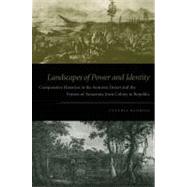Landscapes of Power And Identity
, by Radding Murrieta, Cynthia- ISBN: 9780822336891 | 0822336898
- Cover: Paperback
- Copyright: 3/30/2006
Landscapes of Power and Identity is a groundbreaking comparative history of two separate colonies on the frontiers of the Spanish empire-the Sonora region of northwestern Mexico and the Chiquitos region of eastern Bolivia's lowlands-from the late colonial period through the middle of the nineteenth century. An innovative combination of environmental and cultural history, this book reflects Cynthia Radding's more than two decades of research on Mexico and Bolivia and her consideration of the relationships between human societies and the geographic landscapes they inhabit and create. At first glance, Sonora and Chiquitos are quite different: one, a shrub-covered desert, the other, a tropical rainforest of the greater Amazonian and Paraguayan river basins. Yet the regions are similar in many ways. Both were located far from the centres of colonial authority, organized into Jesuit missions and linked to the principal mining centres of New Spain and the Andes, and then absorbed into nation-states in the nineteenth century. In each area, the indigenous communities encountered European governors, missionaries, slave hunters, merchants, miners, and ranchers.Radding's comparative approach illuminates what happened when similar institutions of imperial governance, commerce, and religion were planted in two different physical and cultural environments. She draws on archival documents, published reports by missionaries and travellers, and previous histories as well as ecological studies and ethnographies. She also considers cultural artefacts, including archaeological remains, architecture, liturgical music, and religious dances. Radding demonstrates how colonial encounters were conditioned by both the local landscape and cultural expectations; how the colonizers and colonized understood notions of territory and property; how religion formed the cultural practices and historical memories of the Sonoran and Chiquitano peoples; and how the conflict between the indigenous communities and the surrounding creole societies developed in new directions well into the nineteenth century.Cynthia Radding is Professor of History and Director of the Latin American and Iberian Institute at the University of New Mexico. She is the author of Wandering Peoples: Colonialism, Ethnic Spaces, and Ecological Frontiers in Northwestern Mexico, 1700-1850, also published by Duke University Press.






